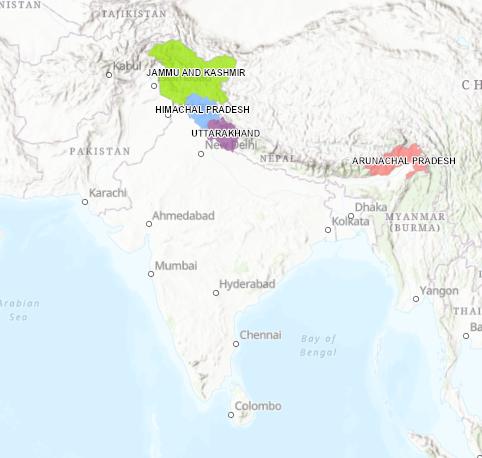Abruptly ending climate intervention might backfire rapidly

Credit: Jyoti Singh
Geoengineering – spraying sulfur dioxide into the atmosphere to combat global warming – would only temporarily and partially benefit apple production in northern India, according to a Rutgers co-authored study.
But abruptly ending geoengineering might lead to total crop failure faster than if geoengineering were not done, according to the study – believed to be the first of its kind – in the journal Climatic Change.
“This study reminds us that there is no perfect technical method to address the impacts of global warming, and that we need to mitigate global warming and adapt as best we can,” said co-author Alan Robock, a Distinguished Professor in the Department of Environmental Sciences in the School of Environmental and Biological Sciences at Rutgers University-New Brunswick. “To reduce the impacts of global warming, in this case on the production of deciduous fruits such as apples, we need to leave the fossil fuels in the ground and move to powering society with wind and solar power as quickly as possible.”
In a 2018 study, Robock and other researchers examined the biological impacts of starting and abruptly ending geoengineering efforts to cool Earth’s climate. Society, responding to a climate emergency, may eventually spray sulfur dioxide into the stratosphere (upper atmosphere). Such geoengineering, or climate intervention, would create a massive sulfuric acid cloud to block some solar radiation and cool the Earth. But if the spraying were to suddenly cease, there would be a major impact on animals and plants, which would be forced to try to move to suitable habitat to survive. The airplane spraying technology may be developed within 10 or 20 years, and a geoengineered cloud would last only about a year if the airplanes stopped continuous spraying.
In their new study, scientists studied the impact of global warming and stratospheric geoengineering on the production of deciduous fruit in Himachal Pradesh, the second-largest apple-producing state in India. They used a climate model to project temperature changes and shifts in suitable habitat for apple orchards under a moderate greenhouse gas emissions scenario and efforts to limit warming.
“We found that global warming would reduce apple production by affecting the winter chill period necessary for the plants,” Robock said. “Adaptation by moving to higher elevation cooler areas, would only partially be successful as the soil there is not as suitable and the overall area where apple production could succeed would be reduced. Geoengineering to counter some of the global warming would have limited benefits and could backfire if it ever ended suddenly.”
Since the study was done with one global warming and geoengineering scenario for one crop in one part of the world, other studies are needed to see how robust the results are in general, Robock noted.
The work was done in collaboration with Jyoti Singh and Sandeep Sahany from the Indian Institute of Technology Delhi in India and the Centre for Climate Research Singapore.
###
Media Contact
Todd Bates
[email protected]
Original Source
https:/
Related Journal Article
http://dx.




